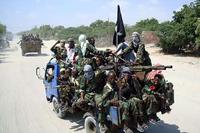-
States’ waste disposal laws limit hospitals’ Ebola-related disposal options
As U.S. hospitals prepare their staff for the possibility of admitting Ebola patients, many are concerned with the laws governing the disposal of Ebola-contaminated medical waste. Protective gloves, gowns, masks, medical instruments, bed linens, cups, plates, tissues, towels, and even pillowcases used on a single Ebola patient treated in a U.S. hospital will generate roughly eight 55-gallon barrels of medical waste each day. The CDC recommends autoclaving or incinerating the waste as a way to destroy the microbes, but California and at least seven other states prohibit burning infected waste.
-
-
Turkey will not agree to U.S. support for Kurds fighting ISIS in Syria: Erdogan
Turkish president Recep Tayyip Erdogan said yesterday (Sunday) that Turkey would not agree to any U.S. arms transfers to Kurdish fighters who are fighting Islamic State (ISIS) militants in Syria. ISIS increased its pressure on the Kurdish city of Kobani, just inside Syria across the Turkish border, but Turkey views the PYD, the main Syrian Kurdish group defending Kobani, as an extension of the PKK, a pro-Kurdish independence group which, in 1984, had launched an insurgency campaign against the Turkish state – a campaign which, until it officially ended in 2012, had cost the lives of about 42,000 Turks
-
-
FBI wants Congress to mandate backdoors in tech devices to facilitate surveillance
In response to announcements by Appleand Googlethat they would make the data customers store on their smartphones and computers more secure and safer from hacking by law enforcement, spies, and identity thieves, FBI director James Comey is asking Congress to order tech companies to build their devices with “backdoors,” making them more accessible to law enforcement agencies.Privacy advocates predict that few in Congress will support Comey’s quest for greater surveillance powers.
-
-
Growing scrutiny of police use of Stingray surveillance technology
IMSI-catcher (International Mobile Subscriber Identity), aka Stingray, is a surveillance technology which simulates cell phone towers in order to intercept mobile phone calls and text messages. Privacy advocates have scrutinized the use of Stingrays in U.S. cities because, when the device tracks a suspect’s cell phone, it also gathers information about the phones of bystanders within the target range. Additionally, police use Stingrays without properly identifying the technology when requesting search warrants has raised concerns.
-
-
Egypt’s military involvement in the anti-Islamist campaign in Libya deepens
Two days ago, on Wednesday, Egypt has escalated its involvement in the battle against Libyan Islamists, as Egyptian warplanes conducted a series of attacks on Islamist militias’ positions in the eastern city of Benghazi. In late August, Egyptian and UAE warplanes attacked Islamist positions in and around Tripoli. Egypt’s growing direct military involvement in Libya has turned that country into yet another theater of a proxy war for broader regional battles, with Qatar and Turkey supporting the extremist Islamist militias while Egypt, Saudi Arabia, and the United Arab Emirates backing the militias’ opponents. The growing Egyptian involvement is an indication that after two years of introspection and confusion, the moderate forces in the Arab world have begun to assert themselves in an effort to gain a measure of control over post-Arab Spring developments in the region.
-
-
Social media firms pledging to keep users anonymous still collect users’ information
Social media firm Whisperprides itself on offering anonymity in a market where the biggest players are often considered too transparent. Its co-founder, Michael Heyward, a tech entrepreneur, describes the company as “the first completely anonymous social network,” an alternative to Facebookand Twitter. It now emerges that Whisper’s back-end systems that retain digital libraries of texts and photographs sent by users, and in some cases the location information of users.
-
-
Boko Haram poses a serious challenge to the Nigerian government

The sophistication of Boko Haram’s operations including the prison break, use of propaganda, and the bombing of key government buildings has led some analysts to suggest that the group might be gaining help from al-Qaeda in the Islamic Maghreb, al-Qaeda in the Arabian Peninsula, or Somalia’s al-Shabaab; the Nigerian government, however, has yet to show any evidence of a connection between Boko Haram and other terrorist groups outside the country. Some Nigerian officials have already admitted that Boko Haram cannot be defeated on the battlefield. “Boko Haram (is) better armed and better motivated than our own troops,” Borno state governor Kashim Shettima said in February 2014. “Given the present state of affairs, it is absolutely impossible for us to defeat Boko Haram.”
-
-
Most states are complying with Real ID, but a few lag behind
Forty U.S. states and some territories have adopted the Real ID Actrequirements for state driver’s licenses and identification cards, mandated by the federal government. Alaska, American Samoa, Arizona, Kentucky, Louisiana, Maine, Massachusetts, Minnesota, Montana, New York, Oklahoma, and Washington are still considered noncompliant as of October 2014. DHS announced a phased enforcement of the Real ID Act in 2013, and residents of non-complying states are already facing restrictions – such as having to present a passport or birth certificate in order to enter restricted areas in federal facilities or nuclear power plants. These restrictions will only tighten between now and January 2016.
-
-
Sale of NYC historic Waldorf Astoria hotel to Chinese firm worries U.S. security officials
Citing an espionage risk, U.S. officials are expressing concern over the sale of the historic Waldorf Astoria hotel in New York City to a Chinese insurance company. The Beijing-based Anbang Insurance Group purchased the property from Hilton Worldwide on 6 October for $1.95 billion. One clause in the sale contract, referring to “a major renovation,” has raised eye brows in Western security services. Specifically, they worry that renovations and modifications to the structure could accommodate Chinese eavesdropping and cyber espionage equipment.
-
-
Turkish jets bomb Kurdish positions
The tensions and acrimony between Turkey and the U.S.-led coalition fighting ISIS have risen to new heights in the last two days. No other country in the region bears as much responsibility as Turkey does for the rise and continuous success of ISIS, and on Monday, Turkey went a step farther in its effort to protect ISIS: Its air force conducted heavy bombing raids against targets of the Kurdish group PKK, one of the more capable Kurdish forces fighting to hold off ISIS and its advances. We should not assume that Turkey’s leaders, pious Muslims though they are, actually espouse or support the extremist version of Islam for which ISIS stands. Rather, Turkey sees ISIS as a tool which, if properly protected, and provided it does not get out of hand, can be used to harass, weaken, or even defeat Turkey’s main adversaries in the region. Turkey’s refusal to contribute to the weakening of ISIS is now running the risk of creating a humanitarian crisis of historical proportions: ISIS forces are closing in on the Kurdish town of Kobani, just inside Syria across from the Turkish border. ISIS has publicly announced that it will kill the 200,000-300,000 Kurdish citizens in the besieged city unless they converted to ISIS version of Islam.
-
-
Minnesota law enforcement helps Somali community fight radicalization, terror recruiting

For years, Minnesota’s Somali community has been battling the recruitment of young men and women into militant groups like al-Shabaab and the Islamic State (ISIS). Several community and religious leaders have helped form youth groups and held public discussions about the radicalization of Somalis in America. Law enforcement agencies are also playing their part. Andy Luger, U.S. Attorney for the District of Minnesota, is working with members of the local Somali community to better understand its concerns and how to help the community fight extremism.
-
-
ISIS and al-Qaeda use social media, Web platforms differently to achieve different ends

The Internet has contributed to the popularity of both al-Qaeda and the Islamic State (ISIS) among would-be jihadists, but the two terror groups use social media and Web platforms differently. Al-Qaeda has been spreading its message via the Internet for nearly two decades, while ISIS is a relative newcomer. Both groups use social media to recruit fighters, but ISIS has successfully developed content that Internet users are likely to share and repost. Such content in the form of violent videos and graphic imagery target young, disillusioned Westerners who are prime for radicalization.
-
-
More research needed to address synthetic biology security concerns
Synthetic biology involves the design of new biological components, devices, or systems that do not exist in nature, or the redesign of existing natural biological systems. Synthetic biology aims to make biological systems work more efficiently or to design biological tools for specific applications — such as developing more effective antibiotics. A new paper examines security risks and policy questions related to the growing field of synthetic biology. While the author does not think the field is ripe for exploitation by terrorists, it does highlight significant gaps in our understanding of the nuts and bolts of lab work in synthetic biology that can contribute to security risks.
-
-
Bay Area’s infrastructure more resilient, but a major tremor would paralyze region’s economy
Twenty-five years ago, the San Francisco Bay Area suffered the 6.9 magnitude Loma Prieta earthquake, which killed sixty-three people, injured 3,700, destroyed 366 businesses and 11,000 homes, and caused $6 billion in property damage. Since then, bridges and roads have been rebuilt to withstand more powerful quakes, but seismic safety experts say more could be done to protect property and human life. A major earthquake is not likely completely to destroy the Golden Gate Bridge or other major infrastructure developments, but the Bay Area’s $535 billion a year economy will come to a halt for months and even years due to weakened critical infrastructure.
-
-
U.S. should emulate allies in pushing for public-private cybersecurity collaboration
Israeli Prime Minister Benjamin Netanyahu announced last month the formation of a national cyber defense authority to defend civilian networks under the leadership of the Israel National Cyber Bureau.The “U.S. government has a lot to learn from successful examples in allied nations. With more compromise and reform, there is plenty of reason for hope,” says a cybersecurity expert, adding that “a cybersecurity partnership between government, business, and individuals built on trust is possible, and would promote more resilient networks as well as creative thinking on cybersecurity.”
-
More headlines
The long view
Factories First: Winning the Drone War Before It Starts
Wars are won by factories before they are won on the battlefield,Martin C. Feldmann writes, noting that the United States lacks the manufacturing depth for the coming drone age. Rectifying this situation “will take far more than procurement tweaks,” Feldmann writes. “It demands a national-level, wartime-scale industrial mobilization.”
No Nation Is an Island: The Dangers of Modern U.S. Isolationism
The resurgence of isolationist sentiment in American politics is understandable but misguided. While the desire to refocus on domestic renewal is justified, retreating from the world will not bring the security, prosperity, or sovereignty that its proponents promise. On the contrary, it invites instability, diminishes U.S. influence, and erodes the democratic order the U.S. helped forge.
Fragmented by Design: USAID’s Dismantling and the Future of American Foreign Aid
The Trump administration launched an aggressive restructuring of U.S. foreign aid, effectively dismantling the United States Agency for International Development (USAID). The humanitarian and geopolitical fallout of the demise of USAID includes shuttered clinics, destroyed food aid, and China’s growing influence in the global south. This new era of American soft power will determine how, and whether, the U.S. continues to lead in global development.
Water Wars: A Historic Agreement Between Mexico and US Is Ramping Up Border Tension
As climate change drives rising temperatures and changes in rainfall, Mexico and the US are in the middle of a conflict over water, putting an additional strain on their relationship. Partly due to constant droughts, Mexico has struggled to maintain its water deliveries for much of the last 25 years, deliveries to which it is obligated by a 1944 water-sharing agreement between the two countries.
How Disastrous Was the Trump-Putin Meeting?
In Alaska, Trump got played by Putin. Therefore, Steven Pifer writes, the European leaders and Zelensky have to “diplomatically offer suggestions to walk Trump back from a position that he does not appear to understand would be bad for Ukraine, bad for Europe, and bad for American interests. And they have to do so without setting off an explosion that could disrupt U.S.-Ukrainian and U.S.-European relations—all to the delight of Putin and the Kremlin.”
How Male Grievance Fuels Radicalization and Extremist Violence
Social extremism is evolving in reach and form. While traditional racial supremacy ideologies remain, contemporary movements are now often fueled by something more personal and emotionally resonant: male grievance.
